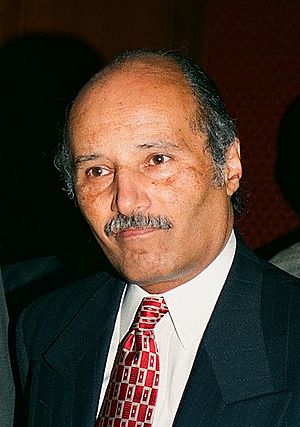Billy Murphy Jr. facts for kids
Quick facts for kids
Billy Murphy Jr.
|
|
|---|---|

Murphy in 1996
|
|
| Born | April 22, 1943 Baltimore, Maryland, U.S.
|
| Education | Massachusetts Institute of Technology (BS), University of Maryland School of Law (JD) |
| Parents |
|
| Relatives | Laura W. Murphy (sister), George B. Murphy Jr. (uncle), John H. Murphy Sr. (great grandfather) |
William H. Murphy Jr. (born April 22, 1943) is a well-known American lawyer and former judge from Baltimore, Maryland. He is currently a managing partner at the Murphy, Falcon, Murphy law firm. As an African-American, Murphy is especially known for his work in civil rights. He has also been active in local politics for many years.
Contents
Early Life and Education
William H. Murphy Jr. was one of five children. His father, William H. Murphy Sr., was one of the first African-American judges in Baltimore. His mother, Madeline Wheeler Murphy, was a community and political activist. His sister is Laura W. Murphy. They grew up in the Cherry Hill neighborhood of Baltimore.
Murphy went to Baltimore City Public Schools. He graduated from Baltimore Polytechnic Institute high school. In 1965, he earned a Bachelor of Science (B.S.) degree in electrical engineering from the Massachusetts Institute of Technology (MIT). He then studied law at the University of Maryland School of Law. He was part of the Law Review and received his law degree (J.D.) in 1969.
A Career in Law and Politics
From the start of his career, Murphy was very active in cases related to civil rights. One of his first successful cases involved defending the First Amendment rights of a newspaper. Murphy became well-known as a lawyer who defended people in criminal cases. He often highlighted how African-Americans had faced unfair treatment in the past.

In 1980, Murphy was elected to Baltimore's Circuit Court. This is Maryland's highest trial court. He served as a judge for two and a half years. In 1983, he left his judge position. He ran for mayor of Baltimore but did not win. During his campaign, he spoke about an "other Baltimore." He said this part of the city needed more attention and resources.
Murphy then returned to practicing law. He mostly handled criminal cases. In 1993, he started a law firm with Cristina Gutierrez. Later, he formed the firm Murphy, Falcon & Murphy with Richard Falcon. Murphy continues to work there as a senior partner. His work now focuses on civil cases. These cases involve disagreements between people or organizations.
The Baltimore Sun newspaper once said that Murphy was known for pushing hard for his clients. Murphy explained that his role was to make sure rules were not used unfairly against people who were not popular. He has received many awards for his work. These include being named "Top Attorney in Maryland" by Baltimore Magazine Super Lawyers in 2009 and 2010. In 2011, he was listed among the "100 Top Trial Lawyers in the U.S." by the American Trial Lawyers Association. In 2004, the University of Baltimore gave him the Charles Hamilton Houston Award for Lifetime Achievement in Litigation.
Murphy also appeared as himself in an episode of the TV show The Wire in 2008.
Advocacy for Fair Policing
In 2015, Murphy represented the family of Freddie Gray. Gray died during an interaction with Baltimore police. Murphy has long spoken out about how police practices can unfairly affect African-Americans. Even in 1999, he suggested that police officers should carry audio recorders. He believed this would help improve courtesy and fairness.
Giving Back
In January 2024, Murphy donated $1 million to the University of Maryland School of Law. This is where he studied law. The school announced that the money would go to the new Gibson-Banks Center for Race and the Law. This center aims to improve the lives of people affected by unfair racial practices from the past and present.
 | Sharif Bey |
 | Hale Woodruff |
 | Richmond Barthé |
 | Purvis Young |

